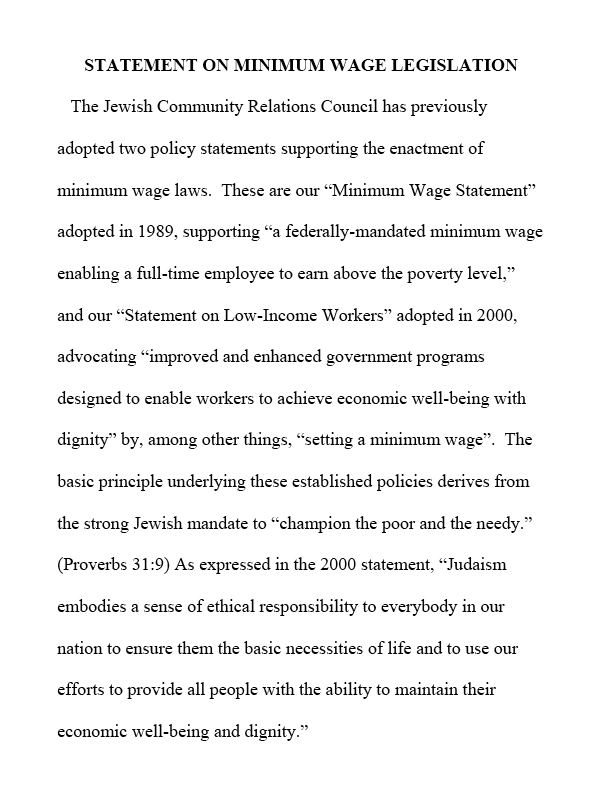Policy Resolution
November 21, 2013
The Jewish Community Relations Council has previously adopted two policy statements supporting the enactment of minimum wage laws. These are our “Minimum Wage Statement” adopted in 1989, supporting “a federally-mandated minimum wage enabling a full-time employee to earn above the poverty level,” and our “Statement on Low-Income Workers” adopted in 2000, advocating “improved and enhanced government programs designed to enable workers to achieve economic well-being with dignity” by, among other things, “setting a minimum wage”. The basic principle underlying these established policies derives from the strong Jewish mandate to “champion the poor and the needy.” (Proverbs 31:9) As expressed in the 2000 statement, “Judaism embodies a sense of ethical responsibility to everybody in our nation to ensure them the basic necessities of life and to use our efforts to provide all people with the ability to maintain their economic well-being and dignity.”
We reaffirm these policies and set forth further criteria to guide our advocacy efforts when presented with minimum wage law proposals.
First, while most workers are paid more than the governmentally-mandated minimum wage, it is nevertheless appropriate and in keeping with basic Jewish values to support minimum wage policies that enable the lowest wage earners, who are likely to be among the most vulnerable, to meet their own and their family’s basic needs.
Second, we are not limited to supporting only a federally-mandated minimum wage. The cost of living is not uniform throughout the United States. Basic living costs may vary from state to state and possibly even among different regions within a state. As stated in our 2000 policy statement, it is appropriate to take account of the fact “that each governmental jurisdiction is different, with different local circumstances.”
Third, any governmentally-mandated minimum wage may become inadequate over time if it fails to maintain a reasonable relationship to changes in the Consumer Price Index that impact the buying power of the dollar.
Fourth, the JCRC will consider the possible impact on the demands placed on social service agencies, both public and private, that will come from not raising the minimum wage.
Finally, while our principal concern is as stated above, as with any government regulation, minimum wage laws can have an economic impact on employers and, in certain cases, the overall availability of certain jobs, and on the jurisdiction as a whole. It is appropriate to consider the likely impact of any minimum wage proposal on employers and overall job opportunities. both to ensure that the basic goal of enabling low-wage workers to achieve economic well-being is not undermined and to avoid causing undue hardship to the legitimate interests of the business community.
Document
